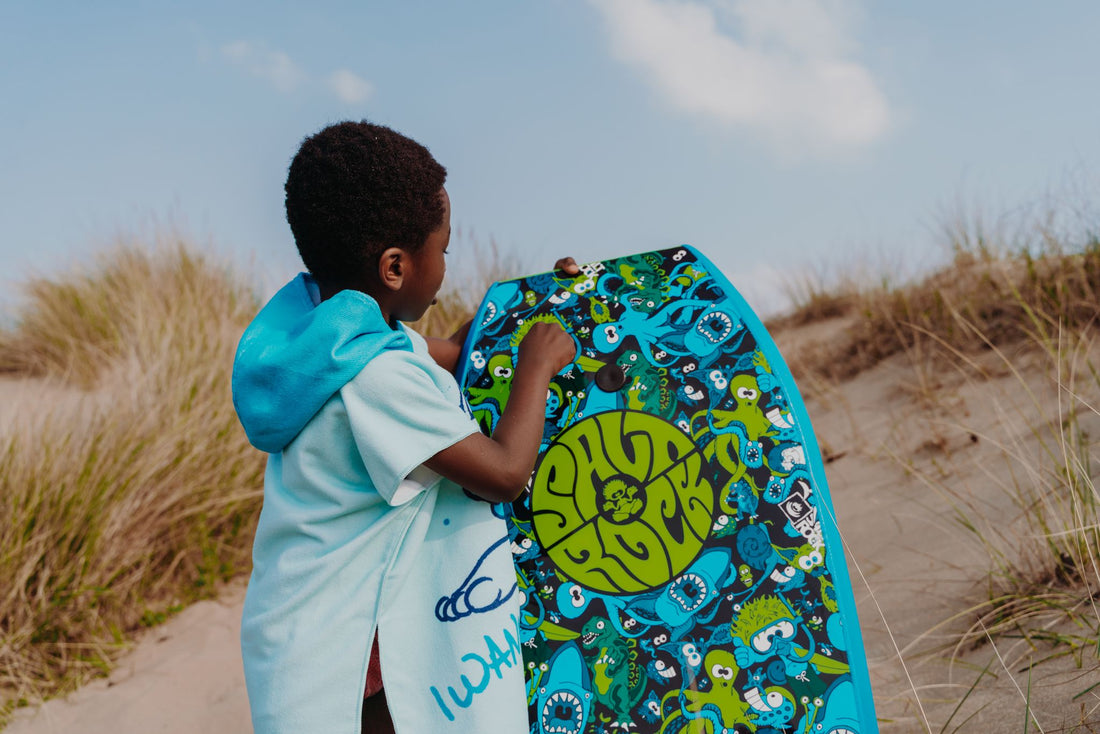With summer on the horizon and bodyboards flying out the surf shops, we feel it’s necessary for us to spread this message to our customers and beyond. With the number of tourists to the southwest expected to reach record numbers this year, many of whom will bring single use face masks, the potential for beach littering is extremely high. We urge all using the beaches to please take home your bodyboards!
Plastic or not, our beaches are not dumping grounds for rubbish, and we should do our best to take home everything that we bring.
We’ve been in contact with Plastic Free North Devon who have already done a great job on ensuring that a lot of the single use bodyboards in the area are no longer being sold as many of them simply end up lying about on the beach for years. More than 500 polystyrene boards were collected from Croyde Beach back in 2019, and clearly many agree that there needs to be change as a Parliamentary Petition to stop the sale of polystyrene boards gained more than 4,500 signatures in one week.
EFFECTS OF POLYSTYRENE ON THE PLANET
The materials that the cheap polystyrene boards are made from are bad for the environment because they are not biodegradable and are resistant to photolysis, therefore will remain on the beach almost indefinitely should they not be cleaned up. They are also made in China and transported over 11,000 miles meaning they have a huge carbon footprint before even being taken out of the shop and discarded on uk beaches.
More than 400 boards were discarded and left on the beach in Croyde, North Devon, in 2020, while beach rangers in Newquay estimate that 20 boards are thrown away per day during the holiday season.
At Saltrock, we urge that these boards should be avoided at all costs, or at the least taken home after use. Neil Hembrow of Keep Britain Tidy estimated last year that over 14,000 bodyboards would be sent to landfill if just two a day were snapped a day on the beaches of Devon and Cornwall.
Because polystyrene is 90% air, its buoyancy allows it to float down channels eventually making it to the ocean, breaking down into small pieces and being consumed by marine life. Furthermore, Styrofoam sitting in landfills produces methane gasses which has 20x the ozone-destroying potency as Co2. Polystyrene never fully degrades, but instead absorbs other chemicals from the environment which bioaccumulates up the food chain affecting sea animals and ultimately humans.
“Leave nothing behind but footprints”
WHAT ARE THE ALTERNATIVES TO CHEAP BODYBOARDS?
You guessed it… more expensive ones!
A good alternative to polystyrene bodyboards are boards made from polyethylene. These boards are more expensive, but virtually indestructible, meaning they are much less likely to be used once and discarded due to breakages. It’s also important to choose a board with a wrist strap to ensure it doesn’t get lost at sea!
Wooden bodyboards are also a great option as they are durable and easily repurposed into other fun things such as skimboards.
Any board that is a bit more expensive will typically be a more solid structure and is more likely to be something you want to take home with you. Our range of bodyboards feature a slick, durable bottom which are designed for strength and durability as well as style so you can catch waves on them for more than one summer.
“The biggest threat to our planet is that someone else will save it” – Robert Swann, OBE
Click here to find a Saltrock store near you!
5 SHOCKING BEACH POLLUTION FACTS
- The estimated amount of plastic pollution is approximately 51 trillion microscopic pieces, equating to 269,000 tons.
- A plastic bottle can remain in the sea for up to 450 years or more. They never completely disintegrate, though.
- The majority of sea litter sinks to the bottom of the ocean, with only 1% floating on the surface.
- It's estimated that 8 million individual pieces of plastic litter enter the ocean daily.
- Plastic causes death to an estimated 1 million sea birds and 100,000 sea mammals every year.
